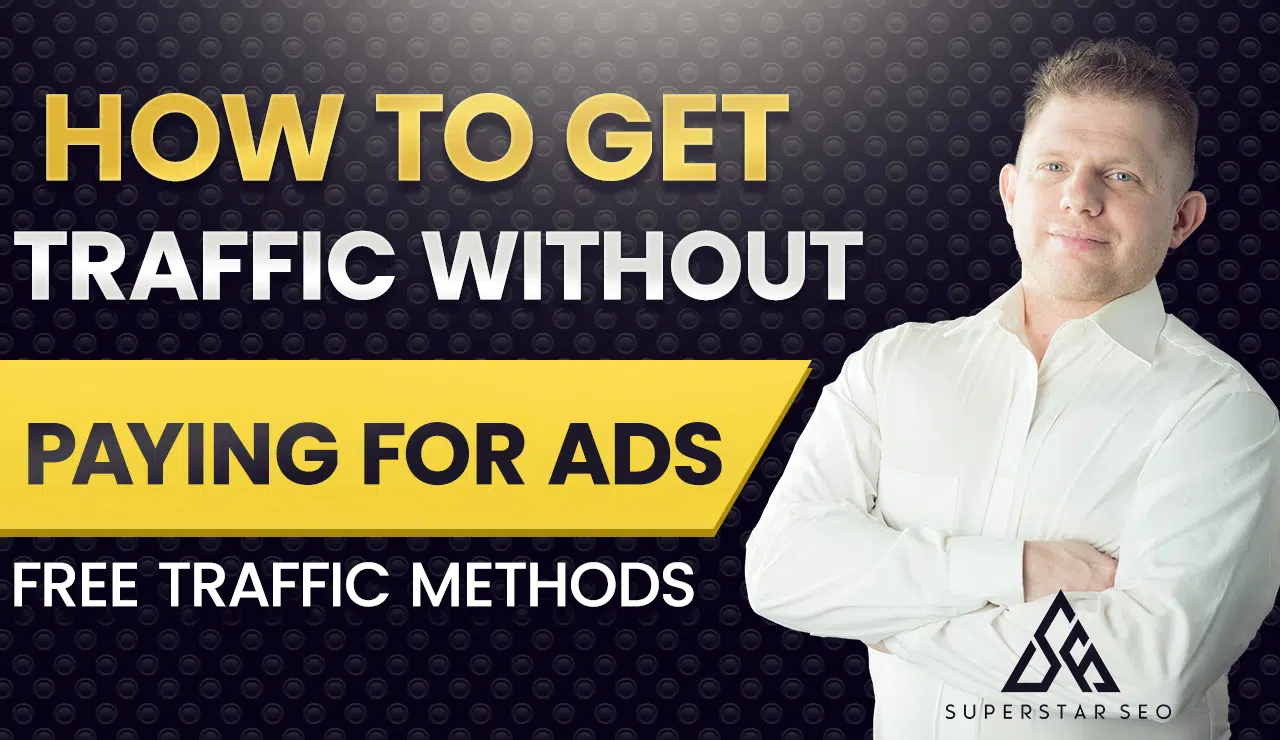Free Website Traffic: How To Make More Sales Without Spending Money On Ads
Looking for a lasting source of free website traffic? Read on to learn how SEO drives organic traffic without spending a single cent on ads.
If you’ve been spending hundreds or even thousands on PPC ads every month, you may be getting pretty frustrated.
In theory, ads are supposed to be a profit machine. Money goes in one end and sales come out the other.
In practice, they often end up more like a headache machine.
You wrack your brain over so many details only to spend 50% of your profit margin to actually make the sale.
Then you’ve got to reinvest that money just to keep your ads going. So at the end of the day, your ads haven’t profited you a thing, especially not once you factor in the opportunity cost of all the time you’ve sacrificed.
So is there a source of free website traffic?
Is there a way to get customers calling you or placing orders without constantly spending money on paid ads?
Yes, and that’s exactly what we are going to show you in this post.
But first, if you aren’t convinced yet, let’s talk a little bit about…
The Problem With Paid Traffic
Don’t get us wrong. There is a time and place for paid advertising.
In fact, it is the only guaranteed method to get on the first page of Google in 24 hours.
But it is also a source of constant frustration for business owners. And here’s why…
Paid Ads Can Be Tough To Manage
Google adwords take constant monitoring and management. You need to be reviewing your analytics on a regular basis to make sure your adspend is actually profitable.
And there are so many different factors to consider:
- Targeting options
- Keywords
- Bid amount and type
- Ad creatives
- Landing page copy
- And more
While a well-oiled ad campaign really can become a money machine, it takes a lot of confusing work and experimentation to get to that point.
Ads Get A Slightly Lower Share Of The Clicks
Organic results account for 53% of clicks from internet searches. The numbers do vary when you start to account for specific search intents. For example, e-commerce searches are starting to show an increase in clickshare for paid ads.
However, the fact remains that internet traffic is clearly divided between paid and organic results. So if you are fed up with dealing with ads, you don’t stand to lose a share of the traffic (and might even gain some) by focusing on organic instead.
If You Aren’t Spending Money, You Aren’t Getting Results
The biggest failing of paid ads is that they are a constant expense.
The moment you reduce your budget, your traffic slows down. If you pause a campaign completely, your ad traffic goes to zero overnight.
Paid ads are very clearly not a long term solution. So what is?
The Solution: Organic Traffic
If your goal is to keep getting traffic from Google without spending money on ads every day, then the obvious solution is organic traffic.
And the only way to get it is search engine optimization (or SEO).
SEO is the only source of free website traffic that will keep bringing visitors to your site for years to come, without a constant monetary investment.
Is SEO Really Free Website Traffic?
To answer that question, let’s consider an analogy.
Imagine you have an apple tree in your backyard. Every fall, it produces enough fruit for you and your family to enjoy fresh, organic apples for the entire season.
Once upon a time, you spent money on apple seeds or a starter plant. You spent some time digging the land, watering the tree, and tending to it as it matured.
But today, you barely have to do anything to keep it maintained. And you never have to go to the grocery store for apples again.
That’s the difference between SEO and pay-per-click ads (PPC):
SEO is planting an apple tree today for a long lasting source of traffic in the future.
PPC is going to the grocery store and spending money every time you want some traffic.
Organic Traffic vs Paid Traffic ROI
As far as return on investment is concerned, organic traffic has a clear long term advantage over paid traffic.
Apple trees aside, let’s look at some numbers. According to one report:
- Every dollar spent on PPC provides 95 cents of profit.
- Every dollar spent on SEO provides $2.75 in profit within the first year.
- Over three years, SEO profits increase to $4.58 per dollar spent.
This is because the benefits of SEO compound over time. Once you rank for a single keyword, you can move on to the next. And the next. And the next.
Meanwhile, all of the previous keywords you ranked for continue to generate traffic and sales for you with minimal upkeep.
We say “minimal” because SEO does require some work to maintain rankings. But it is a far cry from the constant pouring of money into paid ads.
How To Use SEO For A Long Term Source of Free Website Traffic
Let’s look at exactly what you need to do in order to start actually planting that apple tree, watering it, pruning it, and seeing it grow into a long term source of relatively free traffic.
This is absolutely work that you can 100% learn to do all on your own. That being said, we know you’re a busy business owner.
You may want to outsource some or all of these tasks. So throughout this guide, we’ll provide links to freelancers who are skilled at this sort of work, as well as links to tools and resources that can make your job so much easier.
Analyze Your Competition
SEO isn’t rocket science. It’s just about figuring out what your competition is doing to rank, and doing it better.
So the first place you should start is by taking a close look at the on-page SEO factors that the other guys are using.
These are the elements that they are including directly on their ranking pages. The elements of content that they have 100% control over, such as what keywords they use and how often. Here’s a step-by-step process for analyzing your competition:
- Go to Google and do a search for one of the keywords you want to rank for.
- Open the pages ranking in the top 5 positions (or 10 if you want to get really in-depth).
- In a spreadsheet, calculate and track the on-page factors that are listed below for each competitor page.
- Repeat this process for all of the keywords you hope to rank for.
Total Word Count. This is simply the total amount of words used on the page. You can copy and paste the text into https://wordcounter.net/ to get this number relatively quickly.
Keyword Density. To get this number, count the total number of times the keyword appears on the page and divide it by the total word count.
Keyword in H1. Count the number of times that the keyword appears in an H1 tag in the page content. You can find this by right-clicking on the page and selecting “View Source”. Then, do a search for “H1” to quickly jump among various H1 tags in the content (usually, there will only be one).
Keyword in URL. This is simply a yes or no. Check to see if the keyword is in the page’s url.
Keyword in Meta Title. Another yes or no. Does the keyword appear in the page’s meta title on the SERPs?
Keyword in Meta Description. You get the idea by now.
Analyze Yourself
A big part of SEO is being honest with yourself. You can’t make your site better if you don’t examine its weaknesses.
So after you have analyzed your competitors, go through the exact same process for your own site for each keyword that you want to rank for.
Now you’ve got a spreadsheet that shows how you compare against your top competitors when it comes to the most common on-page ranking factors.
Use Audiit To Make Analysis a Cinch
If you are targeting just a couple keywords, that process will only take a little bit of time. But once you’re looking to rank for 10, 20, or maybe even hundreds of search terms, you can see how this sort of SEO analysis can become a real time suck.
The good news is that there are tools that can make it so much faster. We developed Audiit to go through that entire process in the blink of an eye. All you have to do is enter your desired keyword and your web page url. Then Audiit gets to work.
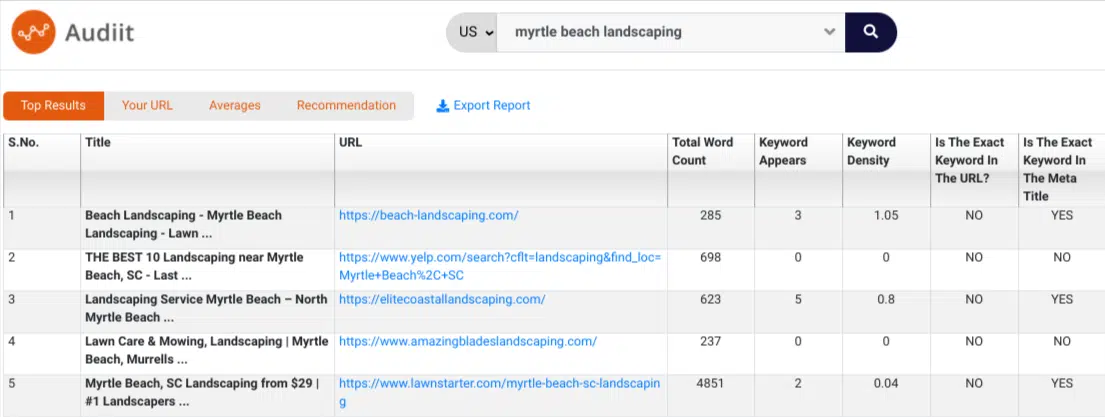
Within a second or two, you will have a complete analysis of your own site and the top 20 ranking competitors on all of the factors listed above and then some.
We’ll also show you the average numbers for the highest rankers, and provide you with a list of actionable recommendations to help you improve your on-page SEO.
Check out Audiit here if you are looking to make competitor analysis a cinch.
Optimize Your Content
Whether you’ve done the hard work yourself or used a tool like Audiit to speed up the process, all that information is useless if you don’t act on it.
You know what your competitors are doing, and you know how your own site compares. Now it’s time to fix your content to better give Google what it likes.
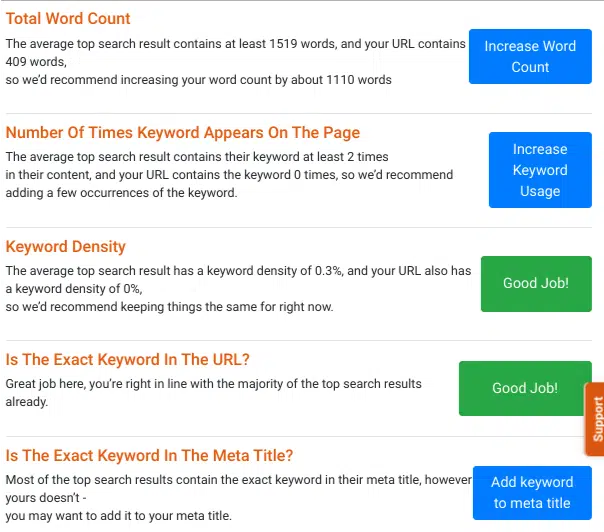
For example, if the top ranking pages average a keyword density of 0.5% and you are sitting at 2.0%, then you know you have to cut some of the keyword stuffing out of your content.
Likewise, if your page is only 300 words long but all your competitors are closer to 1000, you know that you need to find relevant content to add.
If you have an in-house writer or are pretty good with this sort of thing yourself, all the better. But if you don’t have the time or talent on hand, consider checking out the freelancers on Legiit who specialize in On-Page Optimization or Content Writing.
Broaden Your Keyword Scope
At first, you may just be interested in targeting keywords with an obvious buyer intent. For example, if you offer roofing services in Chicago, you may start out by trying to rank for terms like “roof leak repair Chicago” and “Chicago roof replacement”.
But don’t neglect keywords that target users lower in the buying cycle as well. These can help build brand awareness and gather the attention of people who will eventually become customers.
We’re talking about search terms like “roof replacement vs repair” and “are roof leaks covered by insurance”. These informational search terms may not indicate that a searcher is immediately ready to contact you. But they might be in the near future.
So in addition to targeting keywords for your main service pages, go after long tail keywords that are more geared towards blog content. The free website traffic that comes from them will add up over time.
Check out our guide to Keyword Research Made Easy and also this in-depth look at the effectiveness of Long Tail Keywords for SEO. Those will both put you on the path towards finding valuable keywords to help you rank organically without spending a cent on ads.
If you are only managing one website, though, it might not be worth the effort to learn everything there is to know about keyword research. If you would rather just hire a professional to find the best low hanging fruit for your industry, take a look at the freelance keyword research specialists on Legiit.
Build The Backlinks That Matter
Building good content isn’t enough. It’s really just one half of the equation.
The other half to organic SEO is backlinks.
Every backlink you get from an authoritative, relevant source is a vote of confidence for your website. Get enough votes, and Google will start to favor you over your competition.
We’ll cover the basics below, but if you are looking for a deep dive into link building, check out our Beginner’s Guide to Building Links.
Meet and Beat Your Competition
Just like with on-page SEO, the goal with backlinks is to analyze what your competitor is doing, and then do better.
For link building, this means trying to get the same or similar links that they have, plus some. Just keep in mind that not all links are created equally, and quality is more important than quantity.
How do you figure out competitor links? You are gonna need a tool for this. We put together a list of 14 competitor analysis tools that you can browse to find the right one for you. Some are just for on-page SEO, but many of them will show you backlinks as well.
To give you an idea of what you’re looking for, here is an example backlink report from Ahrefs, one of the industry standards in link analysis.
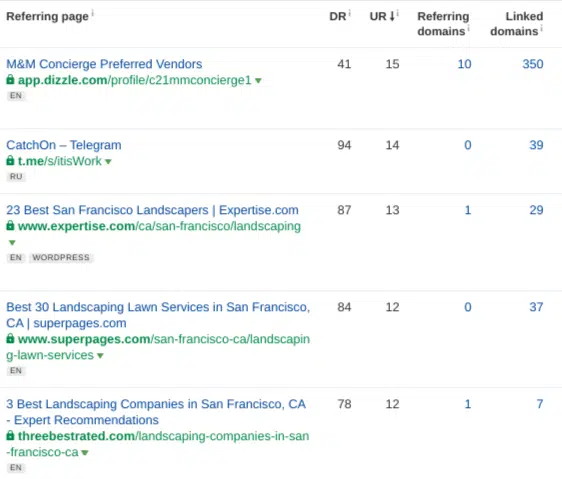
You can see where this site is getting their links from. You can also sort by DR (domain rating) to find which links are the most powerful. It’s not a perfect metric, but it can help you make quick decisions when you only have so much time to spend on link building.
In general, you want to identify the most relevant, most authoritative links that your competition has, and go after those first.
If you can, try to get links from the exact same sites. For any sites for which that isn’t possible, try to match it with something just as powerful.
With that in mind, let’s talk about two of the most important types of links you need to consider: citations and contextual links.
Citations For Local Businesses
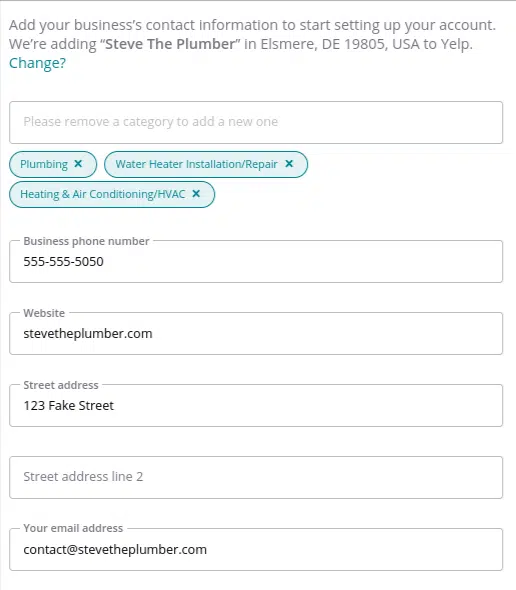
Citations are important for local businesses, especially when it comes to ranking in the map pack. These are links from websites like Yelp
and Foursquare, where you get to create a listing for your business and add information like your address and phone number.
These links are usually free to get, but they help Google recognize your brand and associate your business information with your website.
Citations are easy but tedious to build. After you’ve figured out the basics of what goes into them by creating a few on your own, your time may be better spent training an assistant to build the rest for you.
Alternatively, you could just hire a local SEO expert who has done the process hundreds of times for countless businesses. Because it is such a menial task, it is actually one of the more affordable SEO jobs to outsource.
Contextual Links For Everyone
While citations are mostly beneficial for local businesses with an actual address and service area, pretty much any website will benefit from contextual links.
These, in general, are links placed within blog posts. And they are the most powerful links you can get because they are a clear vote of confidence from the blogger who decided to link to you.
There are a lot of ways to get powerful contextual links. One of the safest methods is guest posting, which involves writing content for other sites.
It’s a win-win relationship. They get fresh content and you get a sweet backlink. Actually getting people to let you guest post for them isn’t always easy though.
That’s why a lot of business owners choose to outsource their guest posts to SEO experts who have already built up a large network of blogger connections.
However you get them, contextual links are a must-have for almost any site trying to rank in a competitive niche.
You May Also Like: Best Affiliate Marketing Programs For Beginners
Ranking Does Take Time
Keep in mind that optimizing your pages and building links isn’t going to get you overnight rankings.
SEO is most definitely a long term strategy (remember the apple tree).
Google takes its sweet time learning to trust a site. But once it starts to trust you, the rate at which you can rank increases significantly.
If you recall our discussion earlier, your ROI can be expected to snowball as time goes on. Compared to PPC, which is always going to provide you the same returns, SEO is a clear winner in the long run.
So be patient, keep plugging away at things, and plant good seeds now so that you can enjoy the juicy fruit of organic rankings for years on end.
Join Superstar SEO Academy To Become A Master Of Free Website Traffic
We have said so much already about using SEO to create a steady stream of free website traffic.
But if you can believe it, that is just the tip of the iceberg.
If you are serious about becoming an SEO master, consider joining the Superstar SEO Academy.
Academy members get access to hours and hours of over-the-shoulder SEO training on everything we have covered here and more.
You’ll also be invited to join our private Facebook mastermind group where you have direct access to our four expert coaches and everyone else in the academy.
Regular content updates, live webinars, and more await. Check out Superstar SEO Academy today.



